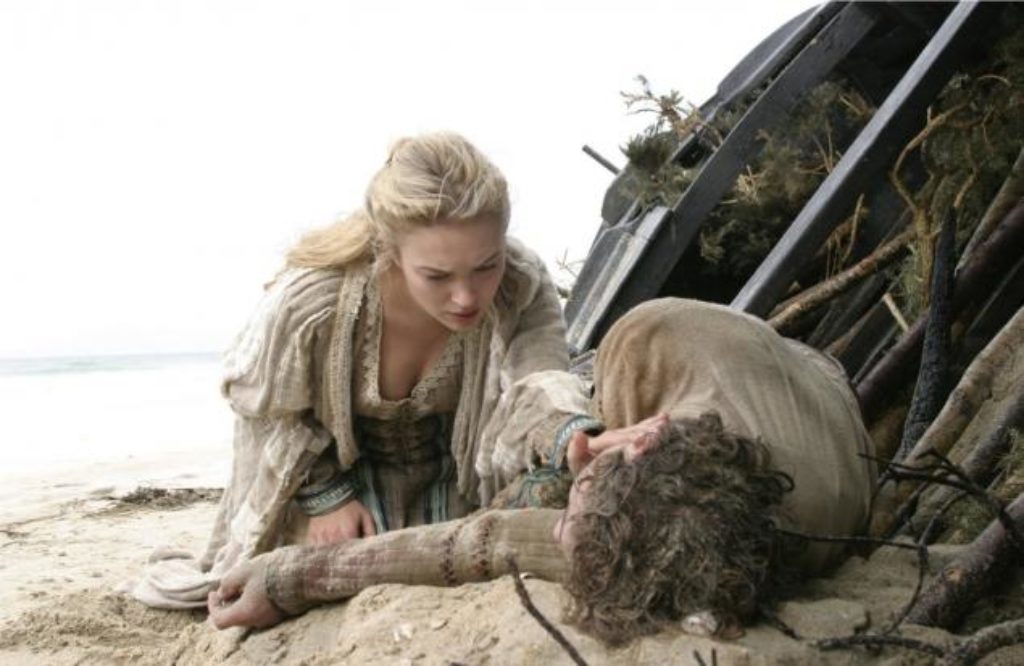
Based on a Celtic myth, this Dark Ages love story is set roughly between the fall of Rome and the time of King Arthur. In the vacuum left by the Romans, the tribes of England are divided and dominated by a powerful Irish king. Any attempt to unite the tribes is met with brutal violence. In one such attack, Lord Marke, the leader of the Cornwall tribe and likely English king, loses his hand saving the life of Tristan, another tribal leader’s son. In the years that follow, Lord Marke raises Tristan into a powerful warrior. When the Irish return to collect English slaves, Tristan leads a bold guerilla attack to free the slaves.
The battle leaves Tristan mortally wounded and assumed dead from a poison tipped sword. Set out to sea in a Viking-style funeral boat, Tristan is discovered unconscious but alive on the Irish shore by Isolde, the daughter of the cruel Irish king. She keeps secret her true identity as she nurses Tristan back to health and the pair fall in love.
Knowing he will be killed if discovered in Ireland, Tristan returns to England a hero. He agrees to fight in an Irish tournament to win Lord Marke a wife and secure his position as the English king. Tristan does not know, however, that the woman being offered is his own Isolde. The lovers must set aside their passion for the good of England, but that will prove difficult.
In battle, many of the English warriors sacrifice themselves to save others, including women and children. In one case, Lord Marke risks his life and loses his hand to save Tristan. Although Tristan loves Isolde and she protests to marrying Lord Marke, Tristan refuses to interfere in their wedding for the sake of his surrogate father and for England. (However, that’s a decision he fails to stand by; more on that in my “Conclusion.”) Eventually, repentance and forgiveness are at least attempted.
Isolde tells her father that she’s been to investigate a convent. He replies that the “new religion” won’t save her from fulfilling her duty to marry whomever he deems appropriate. Later, she tells Tristan that “God made love” and those who reject it will suffer.
Isolde has sex with Tristan before and after her marriage to Lord Marke, and with Marke after their wedding. We see the couples in five or six such scenes, all horizontal head-and-shoulder shots with slight movement. Her breasts are mostly covered. While saving Tristan’s life, Isolde and her maid strip naked to lend him their body heat. (Nothing explicit is seen.) A crass comment is made about herbs helping sexual performance.
The Dark Ages warring is brutal, but depicted with less detail than in R-rated sword-fests Gladiator and Braveheart. Tristan discovers his parents’ bodies after an Irish attack. Marke’s hand is severed; blood spurts. Arrows fly and stick in bodies. Swords leave bloody wounds. A man is hanged in front of a crowd. Two decapitated heads are briefly held aloft. Swords penetrate abdomens, spilling blood. Buildings are burned.
A passing comment is made that there will be “h— to pay.”
Wine seems to be the Dark Ages beverage of choice.
Executive produced by brothers Tony and Ridley Scott, Tristan & Isolde is reportedly a pet project they’ve had in the works for many years. After watching director Kevin Reynold’s version of the story, I can’t help but wonder what it might have been like had Ridley, director of Gladiator and Kingdom of Heaven, taken the reins himself. It might have ended up being considerably more gory, and I’m not voting for that, but few helmers can bring swordsy period action to life as he can. In spite of the authentic-feeling locations and sets, Reynold’s film feels sluggish, obvious and a little stagey. It’s not helped by the performance of James Franco as Tristan, who remains emotionally distant and inscrutable even when he’s supposed to be caught in the throes of passion, grief or rage.
Worse, the story seems designed to make our heroes less and less likable as things progress. At first their impossible situation garners sympathy. It’s a tragically Shakespearean star-crossed scenario: true love that must be embraced or sacrificed for the good of family and country. But without any real chemistry between the leads, their decision to continue the affair after Isolde marries Marke feels not like surrender to an irresistible love, but simple selfish immaturity.
Even if the movie had better captured their passion, it reveals a basic worldview conflict about the question of love. Is romantic love something that happens to us and must reign over us, no matter the cost to everyone involved? Or is love wildly different from attraction, something we control and give away by choice? At one point, Isolde counsels Tristan that “Love is made by God. Ignore it and you will suffer.” She urges him to accept that love is the thing that gives meaning to both life and death. There’s truth in her urgent conviction. But the love God modeled for us was sacrifice to the point of death, not reckless desire or passion. It becomes obvious that the most loving thing Tristan could have done for everyone, including Isolde, would have been to stay away from her.
Some will see it as a cautionary tale for chastity and fidelity. But the movie ultimately mixes its messages, making it unclear whether Tristan and Isolde’s actions are destructive and self-absorbed or something for the mythological record books—worth celebrating through the ages.
